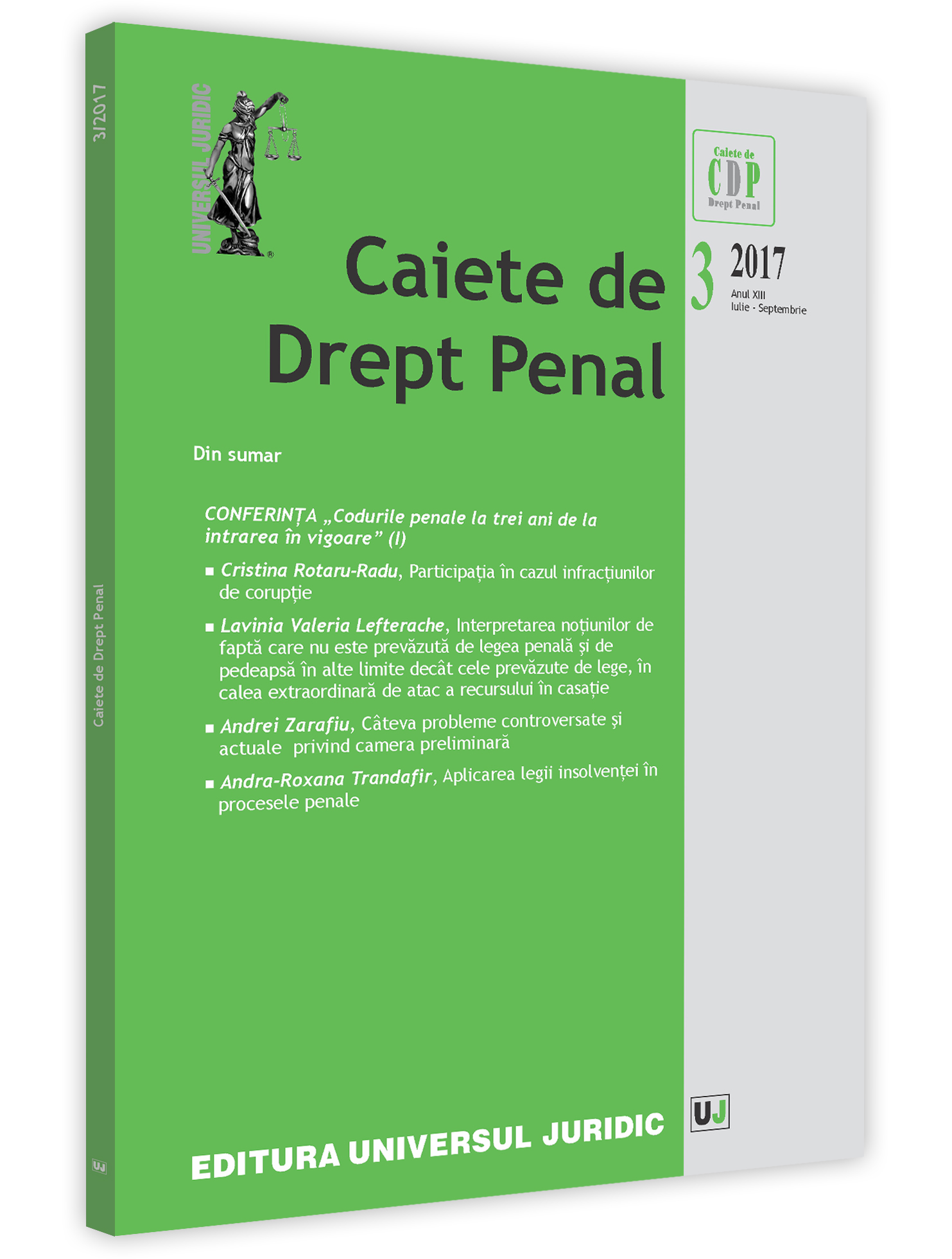Interpretarea noţiunilor de faptă care nu este prevăzută de legea penală şi de pedeapsă în alte limite decât cele prevăzute de lege, în calea extraordinară de atac a recursului în casaţie
The interpretation of the concepts of “offence not provided by criminal law” and “penalty applied according to limits other than those provided by law” in the extraordinary legal remedy of the appeal for review
Author(s): Lavinia Valeria LefteracheSubject(s): Law, Constitution, Jurisprudence
Published by: Universul Juridic
Keywords: appeal for review; offence not provided by criminal law; penalty applied according to limits other than those provided by law; admissibility; causes; circumstances and criteria for personalisation;
Summary/Abstract: The present commentary aims to address two of the cases of appeal for review, art. 438 para. (1) point 7 of the Code of Criminal Procedure (the defendant was convicted for an offence which is not provided by criminal law) and art. 438 para. (1) point 12 of the Code of Criminal Procedure (the penalties were applied according to limits other than those provided by law), as well as the terms for admissibility developed through case-law regarding these two cases.In the first part of the study, the author presents the legal provisions for the appeal for review in the Romanian criminal procedure law and the purpose of this extraordinary legal remedy, pointing the differences between this, the challenge for annulment and the revision. The author also analyses the admissibility of the appeal for review, making the case that the need for respecting legal certainty arising from final court decisions imposes time limits (the term), limits regarding the persons who can apply for the appeal for review and the type of court decisions which can be contested, and limits regarding the cases in which one can apply for this remedy.After assessing admissibility, the analysis focuses on two of the cases for appeal for review: the penalty was applied according to limits other than those provided by law and, respectively, the defendant was convicted for an offence which is not provided by criminal law.The first section is dedicated to the case regarding penalties applied according to limits which are different than those provided by law, seen as a corollary to the principle of legality of sanctions. Starting with the idea that removing some aspects of illegality should not be limited to setting a main penalty within a legal minimum and maximum, as the principle of legality itself is not limited to the legality of the main sanctions, and taking into consideration the fact that the judicial personalisation of penalty and its execution cannot be altered through the legal remedy of the appeal for review, different situations are analysed: the more favourable criminal law, additional and ancillary sanctions, the connection with the provisions of art. 187 of the Criminal code, regarding the `penalty provided by law`, the nature of the penalty, and the causes, the circumstances and the criteria for personalisation. The author focuses particularly on the plurality of offences, on the cases in which the way of determining the sanctions and the errors which occur while determining the resulting penalty may be considered as part of the analysed case, as well as the possibility of appeal for review when the enforcement of the penalty was postponed.The next section analyses the conviction of the defendant for an offence not provided by criminal law as a case for appeal for review. The author shows that this case allows for review in situations in which the actual offence for which the defendant was convicted by final decision does not meet all elements provided by the law incriminating it, and then makes the connection to the provisions of art. 15 of the Criminal code, regarding the definition of the offence. Starting with the altered definition, the author presents the opinions and the solutions regarding the applicability of this case for appeal for review in situations in which the offence was not committed with the form of guilt provided by law. Then, other particular situations are analysed in order to conclude whether they can be attached to this case for appeal for review: some amendments to criminal law over time, the active subject, ne bis in idem and criminal participation.Finally, the last part – `conclusions` –, is dedicated to some lex ferenda proposals. The author believes that the case for the appeal for review should be amended to match the current provisions of art. 16 para. (1) b) of the Code of Criminal Procedure, proposing a provision which stipulates that `the defendant is convicted for an offence which is n ot provided by criminal law or was not committed with the form of guilt provided by the law`. In the same context, one should reflect whether, for the same reasons, the case ought to also include the situation addressed by art. 16 para. (1) d) of the Code of Criminal Procedure: namely, the act was justified or excusable. Regarding the case in which the penalty was applied according to limits other than those provided by the law, the author argues in favour of replacing `penalties` with `sanctions`, as to include security measures and educational measures. Finally, the author believes that other court decisions, which are currently excluded ab initio, should be subject to review as well: decisions regarding offences for which the participation of the victim is required and decisions rendered when the defendant recognises the offences committed – while being prosecuted before trial (I) and during trial (II).
Journal: Caiete de drept penal
- Issue Year: 2017
- Issue No: 03
- Page Range: 22-55
- Page Count: 34
- Language: Romanian
- Content File-PDF

